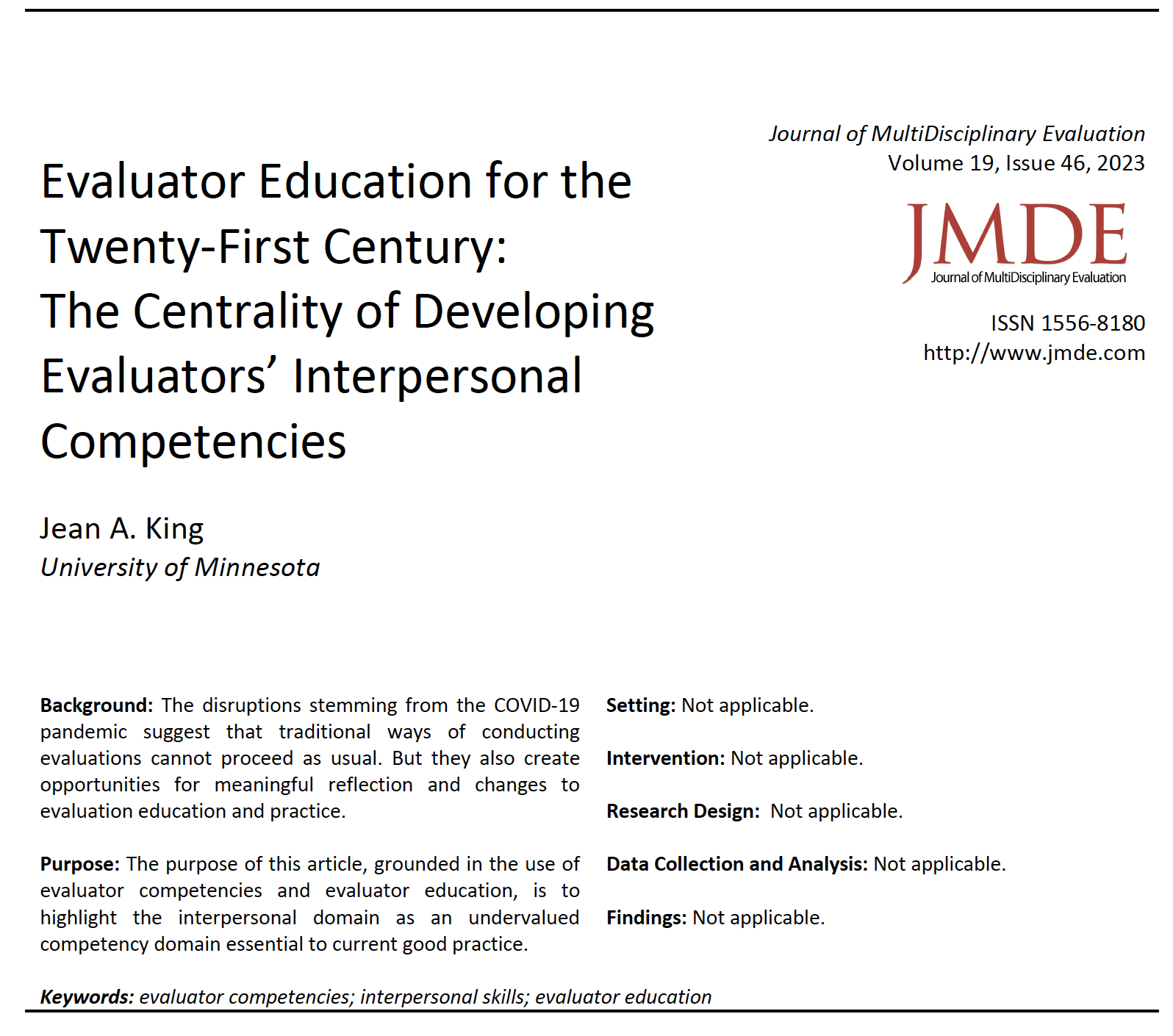Evaluator Education for the Twenty-First Century: The Centrality of Developing Evaluators’ Interpersonal Competencies
Main Article Content
Abstract
This paper first traces the development of competencies for professional evaluators and identifies interpersonal competencies as a key component of evaluator education in the future. It then outlines two roles for evaluators that may affect the application of interpersonal competencies, discusses four ideas for their development, and briefly addresses the possibility of evaluation capacity building. It concludes with a brief discussion of where and how evaluator training or education might effectively teach these competencies and know that people had learned them.
Downloads
Article Details

This work is licensed under a Creative Commons Attribution-NonCommercial 4.0 International License.
Copyright and Permissions
Authors retain full copyright for articles published in JMDE. JMDE publishes under a Creative Commons Attribution-NonCommercial 4.0 International License (CC BY - NC 4.0). Users are allowed to copy, distribute, and transmit the work in any medium or format for noncommercial purposes, provided that the original authors and source are credited accurately and appropriately. Only the original authors may distribute the article for commercial or compensatory purposes. To view a copy of this license, visit creativecommons.org
References
American Evaluation Association (AEA) (2022a). The 2018 Evaluator Competencies.
https://www.eval.org/Portals/0/Docs/AEA%20Evaluator%20Competencies.pdf.
AEA (1995, 2022b). Guiding Principles for Evaluators. https://www.eval.org/About/Guiding-
Principles.
Cambridge Dictionary (2022). https://dictionary.cambridge.org/us/dictionary/English.
Canadian Evaluation Society (CES) (1999). Essential Skills Series. Retrieved from
http://www.evaluationcanada.ca/essential-skills-series-evaluation.
Chouinard, J. & Cram, F. (2020). Culturally responsive approaches to evaluation. Thousand
Oaks, CA: Sage.
Cousins, J. B., Goh, S. C., Elliott, C. J., & Bourgeois, I. (2014). Framing the capacity to do and
use evaluation. New Directions for Evaluation, https://doi.org/10.1002/ev.20076.
Deutsch, M. (1949). A theory of cooperation and competition. Human Relations, 2, 129-151.
Johnson, D. W., Johnson, R. T., & Stevahn, L. (2011). Social interdependence and program
evaluation. In M. M. Mark, S. I. Donaldson, & B. Campbell (Eds.), Social psychology
and evaluation (pp. 288-317). New York: Guilford Press.
Joint Committee on Standards for Educational Evaluation (1994). The program evaluation
standards: A guide for evaluators and evaluation users (2nd ed.). Thousand Oaks,
CA: Sage.
King, J. A. (1998, October). “Becoming pragmatist.” Invited keynote at the Annual Meeting of
the Australasian Evaluation Society, Sydney, Australia.
King, J. A. (2007, November). Bringing evaluative inquiry to life. Keynote at the
Annual Meeting of the American Evaluation Association, Baltimore, MD.
King, J. A. (2020). The American Evaluation Association’s Program Evaluator Competencies.
New Directions for Evaluation, 168, 1–172.
King, J. A. (2023). The “theory” of interactive evaluation practice. In M. C. Alkin & C. A.
Christie (Eds.). Evaluation Roots. 3rd Edition. New York: The Guilford Press, 234-242.
King, J. A., & Ayoo, S. (2020). What do we know about evaluator education? A review
of peer-reviewed publications (1978–2018). Evaluation and Program Planning, 79,
King, J. A., & Pechman, E. M. (1984). Pinning a wave to the shore: Conceptualizing school
evaluation use. Educational Evaluation and Policy Analysis, 6(3), 241-251.
King, J. A., & Stevahn, L. (2013). Interactive evaluation practice: Mastering the interpersonal
dynamics of program evaluation. Los Angeles, CA: Sage.
King, J. A., & Stevahn, L. (2020). Presenting the 2018 AEA Evaluator Competencies. New
Directions for Evaluation, 168, 49-61.
King, J. A., Stevahn, L., Ghere, G., & Minnema, J. (2001). Toward a taxonomy of essential
evaluator competencies. American Journal of Evaluation, 22(2), 229-247.
King, J. A., & Volkov, B. (2005). A framework for building evaluation capacity based on the
experiences of three organizations. Center for Urban and Regional Affairs (CURA) Reporter, 10-16.
LaVelle, J. M. (2020). Educating evaluators 1976-2017: An expanded analysis of university-
based evaluation education programs. American Journal of Evaluation.
https://doi.org/10.1177%2F1098214019860914
Matthias, C. (2022). Practicing evaluators’ visions of social justice: Definitions, theories,
approaches, and problem framing. [Unpublished doctoral dissertation, University of Minnesota].
Merriam Webster Dictionary (2022). https://www.merriam-webster.com/dictionary/.
Patton, M. Q. (2007). Process use as a usefulism. New Directions for Evaluation, 116, 99-112.
Patton, M. Q. (2011). Developmental evaluation: Applying complexity concepts to enhance
innovation and use. New York: The Guilford Press.
Patton, M. Q. (1978). Utilization-focused evaluation. Thousand Oaks, CA: Sage.
Rog, D. J., Fitzpatrick, J. L., Conner, R. F. (2012). Context: A framework for its influence on
evaluation practice. New Directions for Evaluation, 135.
Rogers, A. F. (2021). Advocates for evaluation in culturally diverse non-profit organisations.
[Unpublished doctoral dissertation, University of Melbourne].
Rowe, A., & Uitto, J. I. (PRESENT ISSUE?). Sustainability, evaluation and credentials. The
Journal of MultiDisciplinary Evaluation, ADD?
SenGupta, S., Hopson, R., & Thompson-Robinson (Eds.) (2004). In search of cultural
competence in evaluation: Toward principles and practices. New Directions for
Evaluation, 102.
Smith, M. F. (1999). Should AEA begin a process for restricting membership in the profession of
evaluation? American Journal of Evaluation, 20, 521-531.
Stevahn, L., & King, J. A. (2005). Managing conflict constructively in program evaluation. Evaluation, 11(4), 415-427.
Stevahn, L., King, J. A., Ghere, G., & Minnema, J. (2005). Establishing essential competencies for program evaluators. American Journal of Evaluation, 26(1), 43–59.
Tucker, S. A., Barela, E., Miller, R. L., & Podems, D. (2020). The story of the AEA
Competencies Task Force (2015-2018). New Directions for Evaluation, 168, 31-48.
Tucker, S. A., Stevahn, L., & King, J. A. (2022). Professionalizing evaluation: A time-bound
comparison of the American Evaluation Association’s foundational documents. American Journal of Evaluation, https://doi.org/10.1177/10982140221136486.
Weiss, C. H. (1997). Theory-based evaluation: Past, present, and future. New Directions for
Evaluation, 76, 41–55.
Worthen, B. R. (1994). Is evaluation a mature profession that warrants the preparation of
evaluation professionals? New Directions for Program Evaluation, 62, 3-15.
Yarbrough, D. B., Caruthers, F. A., Shulha, L. M., & Hopson, R. K. (2010). The Program
Evaluation Standards: A Guide for Evaluators and Evaluation Users (3rd ed.). Thousand
Oaks, CA: Sage.

